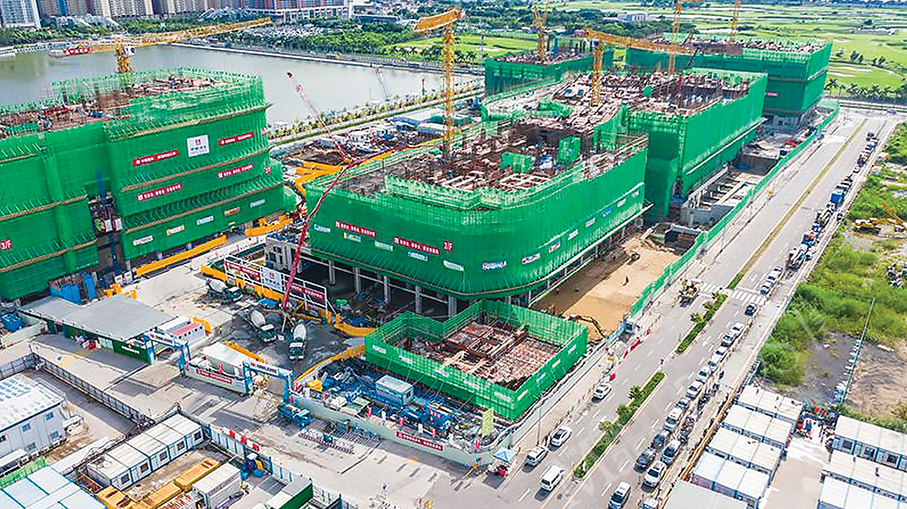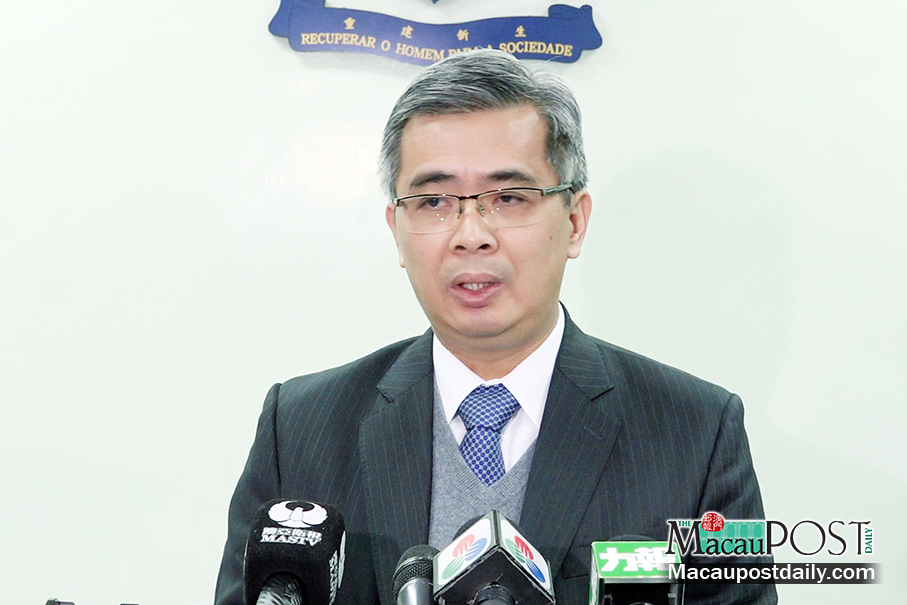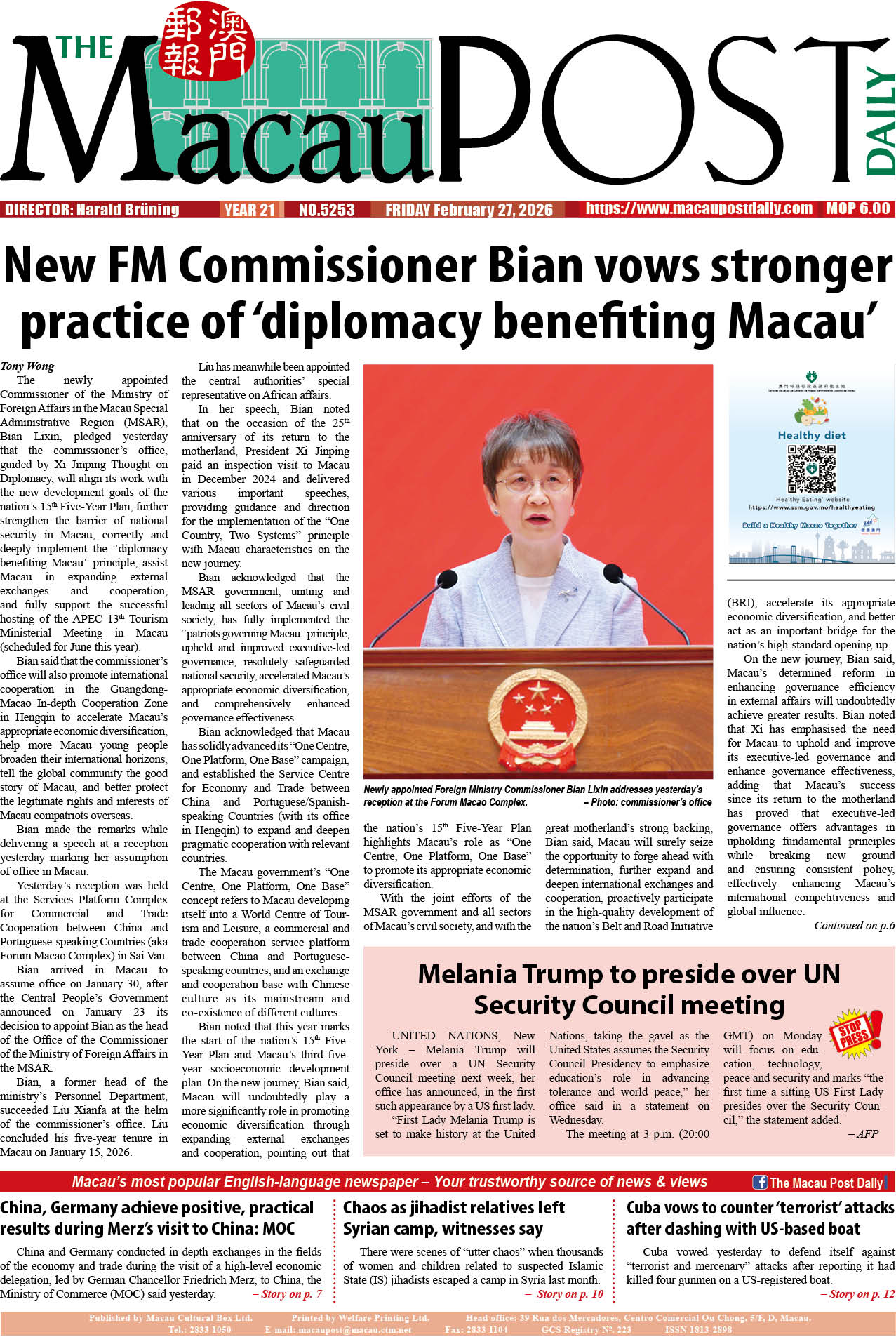The Macau government announced yesterday that its public hospital complex in Cotai, which is slated to come into service in 2023, will be operated by Peking Union Medical College Hospital (aka Beijing Xiehe Hospital), which it described as a world-renowned hospital.
The local government decided to cooperate with the Beijing-based hospital in the operation and management of the Cotai hospital complex – officially known as Islands Healthcare Complex, after considering the National Health Commission’s (NHC) suggestion.
“Islands” is the official term for Taipa, Coloane and Cotai together.
The government reaffirmed that the Cotai hospital will always be a public hospital “by nature”, which will be run by Peking Union Medical College Hospital (北京協和醫院), based on a non-profit and non-commercial cooperation model.
The government’s working group for the setting-up of the Cotai hospital complex made the announcement at a press conference yesterday, which was held in the headquarters of the Health Bureau’s (SSM) Macau Academy of Medicine at the Hotline Centre commercial building in Nape. The working group, which was set up earlier this year, is headed by Lei Chin Ion, the previous director of the Health Bureau.
Two other members of the working group, Wong Cheng Po and Chou Kuok Hei, also attended the press conference.
The Health Bureau announced last month in a press conference that it had commissioned the Faculty of Medicine of the University of Hong Kong (HKUMed) to carry out a research study on the most suitable model for the operation of the Cotai hospital complex.
According to last month’s press conference, the HKUMed research team suggested that the Cotai hospital complex should be run by a private institution, either a commercial organisation or a non-commercial but “excellent” medical institution, for a period of time.
During yesterday’s press conference, Lei noted that the findings of the HKUMed research team suggest that the Macau government cooperate with a third-party institution in the operation of the Cotai hospital. Lei said that after carefully studying the HKUMed research report, the Macau government has concluded that commissioning a third-party institution to run the Cotai hospital would enable the Macau government to achieve a number of objectives for the city’s health sector development, such as introducing a good-quality medical institution with the aim of meeting residents’ diverse needs and choices for health services, and making good use of the brand effect of the selected third-party medical institution with the aim of turning Macau’s specialty medical services into an attractive option for residents, which, Lei said, could reduce the number of patients the Health Bureau has to transfer to hospitals elsewhere for treatment.
Reasons for choosing Peking Union
Lei said that after studying the matter, the Macau government has decided to cooperate with a non-commercial but “excellent” medical institution for the operation and management of the Cotai hospital, with the aim of ensuring the sound implementation of the local government’s policy on health sector development and promoting the sustainable development of the city’s health system.
Consequently, Lei said, the Macau government had asked the National Health Commission to recommend a hospital which could ensure a high level of medical treatment and is renowned in the mainland and overseas, to operate the Cotai hospital and help promote Macau’s health sector development.
Lei said that after carefully considering the suggestion made by the National Health Commission, the local government has decided to choose Peking Union Medical College Hospital as its cooperation partner for the operation and management of the Cotai hospital.
The cooperation arrangement with the Beijing-based hospital will be on a public-private partnership (PPP).
Lei said that Peking Union Medical College Hospital is a renowned hospital in the mainland and even globally.
Lei underlined that despite being operated by a third-party institution, the Cotai hospital complex will “by nature” still be a public hospital, where internationally-advanced medical equipment will be installed.
In addition to public medical services, the Cotai hospital will also offer private medical services, i.e., medical services with charges and fees in line with the private sector.
Both public & private medical services
Lei also underlined that the Macau government’s cooperation with Peking Union Medical College Hospital will be of a non-commercial nature. According to Lei, the public medical services provided by the Cotai hospital will have the same structure of charges as the public Conde de São Januário Hospital Centre, i.e., local residents from certain segments of civil society such as senior citizens will also enjoy free health services at the Cotai hospital, as when undergoing treatment at the public Conde de São Januário Hospital Centre. The Cotai hospital’s private medical services could offer residents more diverse options for receiving medical treatment. According to Lei, the income obtained from the Cotai hospital’s private medical services will be used to finance some of the expenditures used for the hospital’s public medical services and to support the development of the city’s health sector.
Due to the non-commercial cooperation, according to Lei, the Macau government will not need to pay Peking Union Medical College Hospital any service fees, but will only have to pay its staff salaries. Lei said that the cooperation arrangement is the central government’s measure to support the development of Macau’s health sector.
Most staff to be locals
According to Lei, most of the Cotai hospital’s medical, administrative and support staff will be local residents, while only senior doctors, consultant and teaching doctors, and those in the top management team will come from Peking Union Medical College Hospital. Lei reassured the public that the local government’s cooperation with the Beijing-based hospital would not affect job opportunities for local health professionals.
According to Wong, the local government would need to draft legislation to enable a third-party institution to operate the Cotai hospital. In addition, according to Wong, the local government would need to establish a new institution to supervise the operation and management of the Cotai hospital to be carried out by the third-party institution.
Wong also said that local health professionals qualified to work at the Cotai hospital will be able to apply to undergo training at Peking Union Medical College Hospital in Beijing for one to two years.
Wong also said that Peking Union Medical College Hospital’s operation of the Cotai hospital would help Macau develop “health service plus tourism”.
According to Chou, half of the members of the future new official institution supervising the Cotai hospital’s operation will be local health professionals, while the other half will be from Peking Union Medical College Hospital.
The nation’s top hospital
A reporter said that before the COVID-19 pandemic certain Macau residents had chosen to go to Hong Kong for medical treatment as they appeared to be lacking confidence in medical services in Macau and the mainland, and asked how the Macau government could convince residents about the quality of its cooperation with Peking Union Medical College Hospital.
Lei replied that the Macau government had also considered certain other medical institution elsewhere as its possible cooperation partner for the Cotai hospital’s operation. But after considering the Macau government’s current policy in health sector development, the city’s need to integrate into the development of the Greater Bay Area (GBA) and local residents’ recognition, the local government has concluded that Peking Union Medical College Hospital is the most suitable option.
Lei said that Peking Union Medical College Hospital is the nation’s “top hospital and number one hospital”, based on the National Health Commission’s suggestion.
Lei said that some local residents receiving medical treatment at medical institutions in certain countries or regions is a matter of their own choice, which could be regulated by the market. Lei said that even though the Macau government does not have official data indicating the number of local residents choosing to receive medical treatment in places other than the Chinese mainland, according to his “impression” many local residents choose to receive medical treatment in the mainland.
Lei also noted that Macau residents have been prevented from receiving medical treatment in Hong Kong due to COVID-19 quarantine measures over the past one to two years, because of which some of the local patients who would have chosen Hong Kong have meanwhile switched to the mainland for medical treatment, adding that this shows that receiving medical treatment in the mainland could also satisfy their medical needs. The former health chief said he believed that local residents will gain a high degree of confidence in Peking Union Medical College Hospital in operating the Cotai hospital.
Peking Union Medical College Hospital was founded in 1921 by the Rockefeller Foundation and is affiliated to both Peking Union Medical College (PUMC) and the Chinese Academy of Medical Sciences (CAMS).

This undated handout photo taken from the Infrastructure Development Office’s (GDI) website yesterday shows the ongoing Cotai hospital complex project.
Lei Chin Ion (centre), who heads the government’s working group for the setting-up of the Cotai hospital, speaks during yesterday’s press conference at the Hotline Centre commercial building in Nape about its partnership with Peking Union Medical College Hospital, as his fellow members Wong Cheng Po (left) and Chou Kuok Kei look on. Photo: Tony Wong







